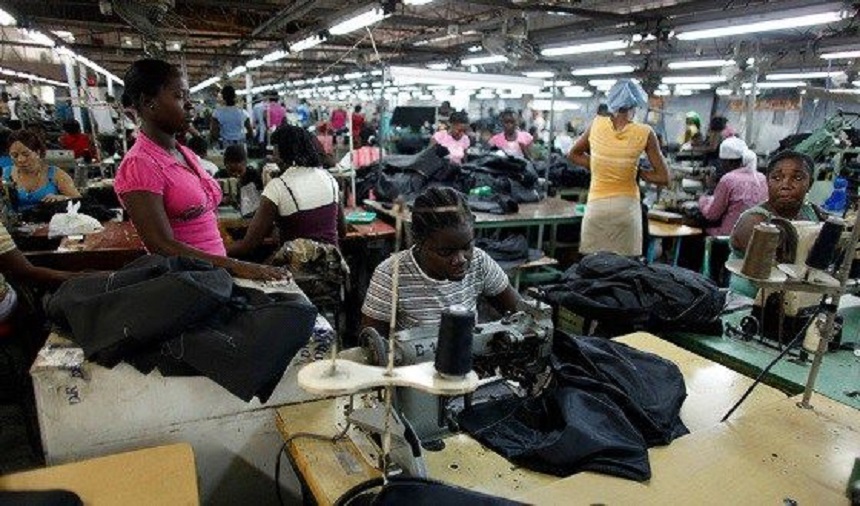Economy
FG Inaugurates National MSMEs Policy Implementation Team

By Adedapo Adesanya
The federal government has inaugurated the Focal Persons Group for the Implementation of the Revised National Policy on Nano, Micro, Small and Medium Enterprises (NMSMEs) 2021-2025.
The Minister of State for Industry, Trade and Investment, Ms Mariam Katagum, inaugurated the group at the Ministry’s head office on Tuesday.
She said the revised national MSMEs policy is very ambitious and requires multi-stakeholder partnership in implementing some of the recommendations.
The Minister said the entire focus of the policy is to create a platform or framework to collaboratively attend to some of the basic challenges of the sector, adding that this is why the scheme is focused on finance, skills development, marketing, technology, research and development.
“Other areas of priority focus include Infrastructure and Cost of Doing Business, Institutional/Legal/Regulatory issues and awareness creation on NMSMEs. These were areas that the Public-Private Dialogue (PPD) focused on both at the National and Zonal engagements.”
The Acting Director General Small and Medium Enterprises Development Agency of Nigeria (SMEDAN), Mr Olawale Fasanya, whose agency coordinated the initiative, stated that the idea to have focal persons was muted during the Public-Private-Dialogue (PPD) sessions facilitated by the Investment Climate Reforms (ICR) Facility.
He said the major problem that most policies usually face is in the implementation stage, adding that the current national policy is obviously an improvement on previous editions with clear recommendations of what the various actors and enablers should be doing to ensure that Nigeria’s MSME sub-sector is not just active but equally globally competitive.
“Essentially, the revised National Policy on MSMEs largely seeks to ensure MSMEs in Nigeria are active, innovative and globally competitive. With over 39 million MSMEs (according to the 2021 SMEDAN/NBS Survey report), the minimum target to be realized before the expiration of the policy in 2025 is to ensure an enabling environment is created for each of the MSMEs to grow and create a minimum of one extra employment which currently stands at over 61 million and also push the sub-sector’s contributions to the Gross Domestic Product (GDP) from the current 49 per cent to 70 per cent.”
On her part, the Director General, Abuja Chamber of Commerce and Industry (ACCI), Mrs Victoria Akai, whose organisation was part of the inaugurated group, in her remarks, stated that the inauguration is one of the key outcomes of the joint support received by SMEDAN and ACCI from the ICR Facility for the development of a coordination mechanism for the implementation of the national policy on MSMEs.
She lauded the commitment of ACCI to the implementation of the policy, adding that it is particularly a great one for the chamber as it demonstrates the realisation of its commitment toward the growth and development of MSMEs in Nigeria.
“It is worthy to note that over 80 per cent of our membership database are MSMEs, therefore we are committed to promoting and supporting every initiative towards the advancement of MSMEs in Nigeria,” Mrs Akai said.
She acknowledged the effort of SMEDAN for the great work and expertise that was put into the development of the national MSME policy, and the revised version which was launched in March 2021, for taking the lead in the development of the coordination mechanism for the implementation policy and for stepping this up by inauguration of the focal points from the various MDAs.
“The chamber appreciates the leadership role being played by SMEDAN as the umbrella body of MSMEs in Nigeria, and will continue to support SMEDAN’s effort as a state chamber and at the national level through the Nigerian Association of Chambers of Commerce Industry, Mines and Agriculture (NACCIMA),” she said.
Mrs Akai also added that the Chamber Business Entrepreneurship Skills and Technology (BEST) Centre, being the training and capacity development arm of the body, has also been working closely with SMEDAN in line with our existing memorandum of understanding to support MSMEs in training, access to finance, exhibitions, business support and mentorship.
Economy
Strong Investor Sentiment Keeps NGX Index in Green Territory by 0.31%

By Dipo Olowookere
The Nigerian Exchange (NGX) Limited remained in the green territory on Wednesday after it rallied by 0.31 per cent on the back of sustained bargain-hunting activities by investors.
Business Post reports that all the key sectors of the market closed higher at midweek as a result of the renewed interest in local equities.
Data showed that the energy index appreciated by 2.59 per cent, the insurance space grew by 2.34 per cent, the industrial goods sector improved by 0.15 per cent, the banking counter expanded by 0.06 per cent, and the consumer goods industry rose by 0.04 per cent.
At the close of business, the All-Share Index (ASI) gained 302.71 points to settle at 98,509.68 points compared with Tuesday’s closing value of 98,206.97 points and the market capitalisation added N183 billion to close at N59.715 trillion versus the preceding day’s N59.532 trillion.
It was observed that the level of activity yesterday waned as the trading volume, value and number of deals decreased by 65.93 per cent, 49.22 per cent, and 12.70 per cent, respectively.
On Wednesday, a total of 320.1 million stocks valued at N6.5 billion were transacted in 7,943 deals, in contrast to the 939.4 million stocks worth N12.8 billion traded in 9,098 deals.
The busiest equity at midweek was eTranzact, which transacted 70.3 million units for N474.2 million, Universal Insurance traded 23.8 million units worth 8.1 million, Zenith Bank exchanged 21.2 million units valued at N933.5 million, FBN Holdings sold 18.6 million units worth N491.2 million, and UBA traded 14.0 million units valued at N465.8 million.
At the close of transactions, 34 shares ended on the gainers’ log and 17 shares finished on the losers’ chart, representing a positive market breadth index and strong investor sentiment.
Africa Prudential gained 10.00 per cent to quote at N14.30, Conoil also improved by 10.00 per cent to N352.00, and RT Briscoe expanded by 10.00 per cent to N2.42, as Golden Guinea Breweries jumped by 9.95 per cent to N7.18, while NEM Insurance grew by 9.74 per cent to N10.70.
However, Julius Berger lost 10.00 per cent to close at N155.25, Secure Electronic Technology shed 9.52 per cent to trade at 57 Kobo, Multiverse declined by 7.63 per cent to N5.45, Haldane McCall tumbled by 6.07 per cent to N4.95, and Honeywell Flour crashed by 5.62 per cent to N4.70.
Economy
Crude Oil Jumps as EU Slams Fresh Sanctions on Russia

By Adedapo Adesanya
Crude oil prices went up on Wednesday after the European Union (EU) agreed to an additional round of sanctions threatening Russian oil flows that could tighten global crude supplies.
During the session, Brent crude futures jumped by $1.33 or 1.84 per cent to $73.52 a barrel and the US West Texas Intermediate (WTI) crude futures rose by $1.70 or 2.48 per cent to $70.29 per barrel.
EU ambassadors agreed on a 15th package of sanctions on Russia over its war against Ukraine, targeting its shadow tanker fleet and Chinese firms making drones for the country.
The sanctions would target vessels from third countries supporting Russia’s war in Ukraine and add more individuals and entities to the sanctions list. It will not be adopted until after foreign ministers approve the package on Monday.
The shadow fleet has aided Russia in bypassing the $60 per barrel price cap imposed by the G7 on Russian seaborne crude oil in 2022 and has helped keep Russian oil flowing.
Prices were supported by the Energy Information Administration (EIA) which reported an estimated inventory decline of 1.4 million barrels for the week to December 6. In fuels, however, the EIA estimated sizable builds.
The crude oil inventory figure compares with a draw of 5.1 million barrels for the previous week that pushed prices higher for a while but the gains soon got erased by weak global demand growth prospects.
A day before the EIA, the American Petroleum Institute (API) had estimated inventory changes at a positive 499,000 barrels for the week to December 6.
Meanwhile, on Wednesday, the Organisation of the Petroleum Exporting Countries (OPEC) cut its 2024 global oil demand growth forecast for a fifth straight month and by the largest amount.
In its December report, the cartel expects 2024 global oil demand to rise by 1.61 million barrels per day, down from 1.82 million barrels per day last month.
OPEC also cut its 2025 growth estimate to 1.45 million barrels per day from 1.54 million barrels per day.
The 210,000 barrels per day cut in the 2024 figure is the largest of the five reductions OPEC has made in its monthly reports since August. In July, OPEC had expected world demand to rise by 2.25 million barrels per day.
Weak demand, particularly in top importer China, and non-OPEC+ supply growth were two factors behind the move.
Economy
Again, OPEC Cuts 2024, 2025 Oil Demand Forecasts

By Adedapo Adesanya
The Organisation of the Petroleum Exporting Countries (OPEC) has once again trimmed its 2024 and 2025 oil demand growth forecasts.
The bloc made this in its latest monthly oil market report for December 2024.
The 2024 world oil demand growth forecast is now put at 1.61 million barrels per day from the previous 1.82 million barrels per day.
For 2025, OPEC says the world oil demand growth forecast is now at 1.45 million barrels per day, which is 900,000 barrels per day lower than the 1.54 million barrels per day earlier quoted.
On the changes, the group said that the downgrade for this year owes to more bearish data received in the third quarter of 2024 while the projections for next year relate to the potential impact that will arise from US tariffs.
The oil cartel had kept the 2024 outlook unchanged until August, a view it had first taken in July 2023.
OPEC and its wider group of allies known as OPEC+ earlier this month delayed its plan to start raising output until April 2025 against a backdrop of falling prices.
Eight OPEC+ member countries – Saudi Arabia, Russia, Iraq, United Arab Emirates, Kuwait, Kazakhstan, Algeria, and Oman – decided to extend additional crude oil production cuts adopted in April 2023 and November 2023, due to weak demand and booming production outside the group.
In April 2023, these OPEC+ countries decided to reduce their oil production by over 1.65 million barrels per day as of May 2023 until the end of 2023. These production cuts were later extended to the end of 2024 and will now be extended until the end of December 2026.
In addition, in November 2023, these producers had agreed to voluntary output cuts totalling about 2.2 million barrels per day for the first quarter of 2024, in order to support prices and stabilise the market.
These additional production cuts were extended to the end of 2024 and will now be extended to the end of March 2025; they will then be gradually phased out on a monthly basis until the end of September 2026.
Members have made a series of deep output cuts since late 2022.
They are currently cutting output by a total of 5.86 million barrels per day, or about 5.7 per cent of global demand. Russia also announced plans to reduce its production by an extra 471,000 barrels per day in June 2024.
-

 Feature/OPED5 years ago
Feature/OPED5 years agoDavos was Different this year
-
Travel/Tourism8 years ago
Lagos Seals Western Lodge Hotel In Ikorodu
-

 Showbiz2 years ago
Showbiz2 years agoEstranged Lover Releases Videos of Empress Njamah Bathing
-

 Banking6 years ago
Banking6 years agoSort Codes of GTBank Branches in Nigeria
-

 Economy2 years ago
Economy2 years agoSubsidy Removal: CNG at N130 Per Litre Cheaper Than Petrol—IPMAN
-

 Banking2 years ago
Banking2 years agoFirst Bank Announces Planned Downtime
-

 Sports2 years ago
Sports2 years agoHighest Paid Nigerian Footballer – How Much Do Nigerian Footballers Earn
-

 Technology4 years ago
Technology4 years agoHow To Link Your MTN, Airtel, Glo, 9mobile Lines to NIN























